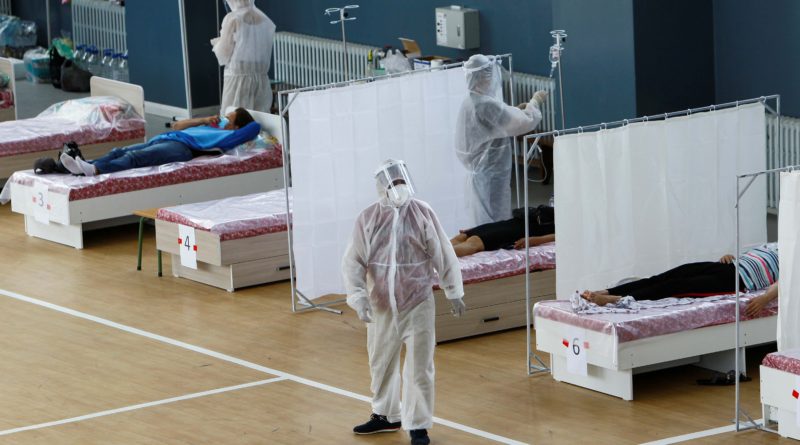Kyrgyzstan/Kazakhstan: New Rules for Tallying Covid-19 Data
(Berlin) – The decision on July 17, 2020 by the governments of Kazakhstan and Kyrgyzstan to start counting certain cases of pneumonia as Covid-19 in official data provides greater transparency and accountability and should improve their ability to protect people’s health, Human Rights Watch said today.
“It’s important that, in line with World Health Organization guidelines, the authorities in Kyrgyzstan and Kazakhstan have decided to include pneumonia cases in official Covid-19 data,” said Mihra Rittmann, senior Central Asia researcher at Human Rights Watch. “Collecting accurate information about Covid-19 infections is vital to stemming the spread of the disease.”
On July 16, Kyrgyzstan’s vice prime minister, Aida Ismailova, said that Kyrgyzstan would classify pneumonia cases showing clinical or radiological consistencies with Covid-19 as Covid-19 cases, even when those cases have not been confirmed by a test for Covid-19. The following day in neighboring Kazakhstan, the Health Minister Aleksei Tsoi announced that starting August 1, pneumonia cases showing epidemiological links to Covid-19 or clinical signs of the disease would similarly be counted in Kazakhstan’s Covid-19 data, even if there was no Covid-19 test for confirmation.
All countries should transparently report suspected, probable, and confirmed cases, and deaths, from Covid-19, Human Rights Watch said. They should also thoroughly investigate cases of pneumonia to determine the possibility of infection with the novel coronavirus.
The change in policy is a positive step, as authorities have downplayed the spread of Covid-19, including by relying on misleading data, since March, when the first cases of Covid-19 were registered in Kyrgyzstan and Kazakhstan.
Today Kyrgyzstan and Kazakhstan are among the countries with the fastest growing number of confirmed Covid-19 infections. The Kyrgyz and Kazakh governments should urgently allocate resources to set up surge triage, screening areas, treatment, and critical care units at health facilities across the country to respond to the growing number of Covid-19 infections, including for people at greatest risk.
Kyrgyz and Kazakh authorities previously excluded suspect or probable cases of Covid-19, such as pneumonia, from their official tally of infections and deaths, instead reporting only cases confirmed by a test in a laboratory. In early June, Kazakhstan further excluded asymptomatic Covid-19 cases from its overall tally, although that decision has since been reversed. Doing so kept the overall official number of Covid-19-related infections and deaths relatively low in both countries.
When Kyrgyzstan lifted lockdown restrictions in early May, the head of the national center for the control of viral infections in Kyrgyzstan said that the number of Covid-19 infections had already reached its peak. In Kazakhstan, the vice prime minister said on May 11 that authorities “were able to keep the spread of infection in the country at a manageable level.”
Kazakhstan’s and Kyrgyzstan’s failure to report comprehensive data at a time when cases were actually still on the rise helped to paint a more promising picture of the Covid-19 spread than was actually true, and may have contributed to people downplaying the risks and exposing themselves to the virus, Human Rights Watch said.
Publishing clear, transparent, and comprehensive data, including estimates of the number of suspected deaths from Covid-19 as well as confirmed Covid-19-related deaths, is essential to help the wider public understand the scope and true threat of the pandemic, Human Rights Watch said.
The lack of such data can also impede the development of effective strategies to prevent the spread of Covid-19 and to protect the right to health.
Since the sharp rise in infections in early July, media have reported that health systems in Kyrgyzstan and Kazakhstan are stretched thin or overwhelmed.
The authorities have made some efforts to respond to the surge in Covid-19 cases, such as increasing the capacity of medical facilities by converting hotels and large sports complexes into Covid-19 hospitals. But reports of people scrambling to find hospital beds and medicine for their loved ones indicate that authorities in both countries need to further augment healthcare capacity.
Kazakhstan and Kyrgyzstan also have very high rates of Covid-19 infection among medical workers. Medical workers make up approximately 16 percent of the total number of infections in Kyrgyzstan, according to data published on July 13, and 11 percent of infections in Kazakhstan, according to data published July 3.
Citing Kazakhstan’s Health Ministry, Deutsche Welle reported that regional hospitals are currently at 60 percent capacity, while hospitals in Nur-Sultan and Almaty are at 90 percent. After a doctor filmed an overcrowded hospital in Aktau, Kazakhstan, the local government published the clip with a warning that people should isolate and stay at home. In June hospitals in Almaty and Nur-Sultan suspended nonemergency patient appointments due to a lack of beds.
Kyrgyzstan’s deputy health minister said on July 1 that Kyrgyzstan does not have enough ventilators to meet spiking rates of infection. Bishkek city’s head doctor confirmed that two people had died on June 29 outside the national hospital waiting to be admitted, before doctors could even examine them. On July 6 the United States Embassy in Bishkek noted that “Local medical services in Bishkek are overwhelmed. Hospital beds are unavailable and doctors and nurses are in short supply.”
Under international law, everyone has the right to the highest attainable standard of health, and governments are obligated to take steps to prevent, treat, and control epidemics and other diseases. WHO guidelines state that “Health care facilities should be prepared for a significant increase of Covid-19 cases while maintaining provision of essential health services.”
In responding to the increase in Covid-19 cases, the authorities should pay special attention to populations that are at highest risk, including older people or people with disabilities living in institutions, individuals with underlying health conditions, and people in prison, such as human rights defenders Max Bokaev of Kazakhstan and Azimjon Askarov of Kyrgyzstan, Human Rights Watch said.
“There is a very real and devastating crisis in Kazakhstan and Kyrgyzstan with a growing number of people infected with and dying of Covid-19,” Rittmann said. “The authorities should take urgent steps to protect those at highest risk and ensure that everyone can get the care they need.”




